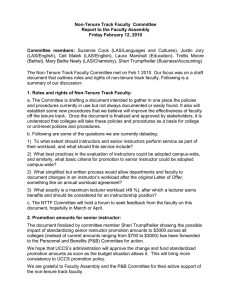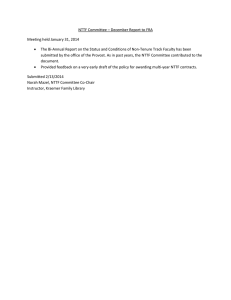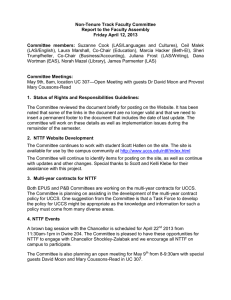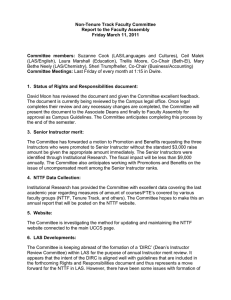Non-Tenure Track Faculty Committee Report to the Faculty Assembly
advertisement
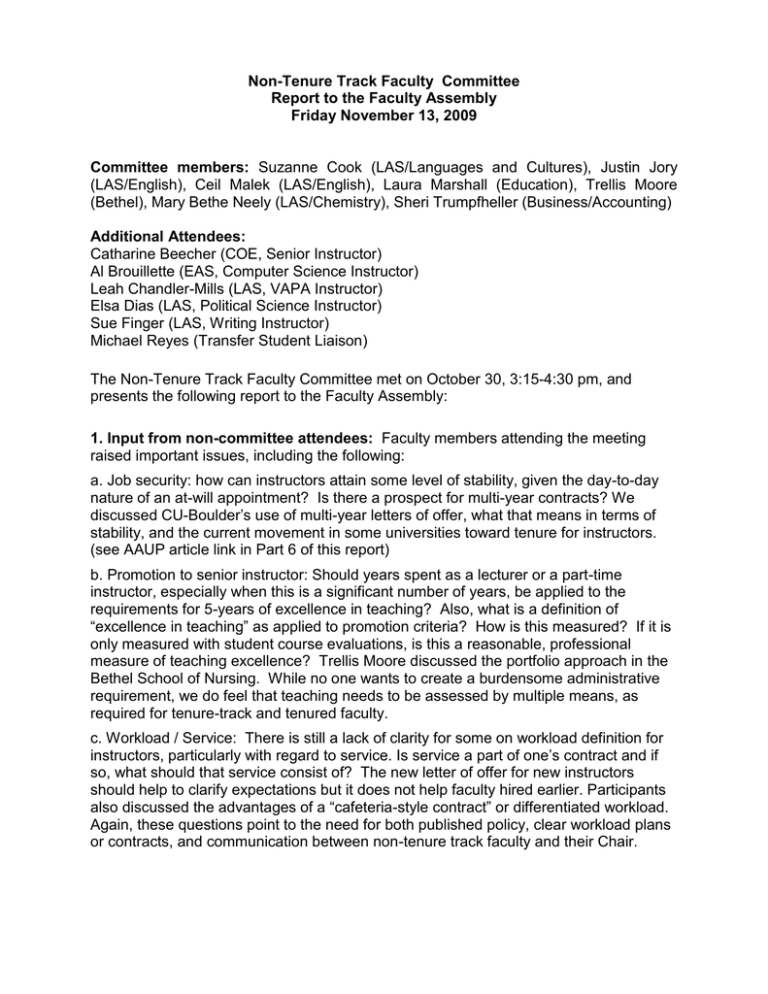
Non-Tenure Track Faculty Committee Report to the Faculty Assembly Friday November 13, 2009 Committee members: Suzanne Cook (LAS/Languages and Cultures), Justin Jory (LAS/English), Ceil Malek (LAS/English), Laura Marshall (Education), Trellis Moore (Bethel), Mary Bethe Neely (LAS/Chemistry), Sheri Trumpfheller (Business/Accounting) Additional Attendees: Catharine Beecher (COE, Senior Instructor) Al Brouillette (EAS, Computer Science Instructor) Leah Chandler-Mills (LAS, VAPA Instructor) Elsa Dias (LAS, Political Science Instructor) Sue Finger (LAS, Writing Instructor) Michael Reyes (Transfer Student Liaison) The Non-Tenure Track Faculty Committee met on October 30, 3:15-4:30 pm, and presents the following report to the Faculty Assembly: 1. Input from non-committee attendees: Faculty members attending the meeting raised important issues, including the following: a. Job security: how can instructors attain some level of stability, given the day-to-day nature of an at-will appointment? Is there a prospect for multi-year contracts? We discussed CU-Boulder’s use of multi-year letters of offer, what that means in terms of stability, and the current movement in some universities toward tenure for instructors. (see AAUP article link in Part 6 of this report) b. Promotion to senior instructor: Should years spent as a lecturer or a part-time instructor, especially when this is a significant number of years, be applied to the requirements for 5-years of excellence in teaching? Also, what is a definition of “excellence in teaching” as applied to promotion criteria? How is this measured? If it is only measured with student course evaluations, is this a reasonable, professional measure of teaching excellence? Trellis Moore discussed the portfolio approach in the Bethel School of Nursing. While no one wants to create a burdensome administrative requirement, we do feel that teaching needs to be assessed by multiple means, as required for tenure-track and tenured faculty. c. Workload / Service: There is still a lack of clarity for some on workload definition for instructors, particularly with regard to service. Is service a part of one’s contract and if so, what should that service consist of? The new letter of offer for new instructors should help to clarify expectations but it does not help faculty hired earlier. Participants also discussed the advantages of a “cafeteria-style contract” or differentiated workload. Again, these questions point to the need for both published policy, clear workload plans or contracts, and communication between non-tenure track faculty and their Chair. 2. Data to support standardization of senior instructor promotion amounts: Sheri Trumpfheller presented data gathered with the help of Institutional Research to show the impact of standardizing senior instructor promotion amounts to $3000 across all colleges over the next 5 years, instead of the widely varied amounts currently awarded (from $700 to $3000 depending on the college and department). The NTTF Committee is committed to the implementation of this change as well as the indexing of the promotion amount in future years as are promotion amounts for tenured and tenuretrack faculty, and as approved unanimously by the Faculty Assembly in the Fall of 2008. 3. Impact of financial crisis on non-tenure track faculty: Participants discussed the need to be actively involved in current and future directions the colleges and the campus will take to deal with budget restrictions. The growth in student enrollment is critical to counter-balance state budget cuts, and a well-balanced mix of expert faculty, both tenure-track and non-tenure track, will be essential to offer students the outstanding education UCCS promises. 4. Developing UCCS guidelines for NTTF: The Committee discussed the strengths and weaknesses of an Aug 2009 document from CU-Boulder’s Provost outlining policies for non-tenure track faculty at the Boulder campus. a. We committed to developing a UCCS version of such a document, to serve as the basis for other efforts such as grievance policies being developed by the Associate Deans’ Council. Developing such a document will not only better define rights and duties of the NTTF, it will also serve as a case study for the committee on how to best develop and implement policy, one of our stated priorities (see the October NTTF report). b. General comments on the Boulder document: Its strengths include the reference to multi-year renewable letters of offer, and the mention of the importance of academic freedom for all faculty. Weaknesses include certain recommendations regarding lecturers and the general tone regarding the role of NTTF. We agreed that the definition of roles of the NTTF should be tied to stated UCCS strategic goals. c. The NTTF Committee members will work with the Associate Vice-Chancellor for Academic Affairs in the next months and hope to see an approved document by the end of Spring 2010. 5. System-wide dialogue: Committee chair Suzanne Cook will meet with CU-Denver and CU-Boulder counterparts on Nov 14 and will report back to the committee. 6. Recommended reading: AAUP’s Committee on Contingent Faculty and the Profession published a report on the Conversion of Appointments to the Tenure Track (2009). It presents both positive and negative aspects of current efforts nation-wide to offer tenure to instructors. CU-Boulder's efforts are highlighted in Appendix B. The link is: http://www.aaup.org/AAUP/comm/rep/conversion.htm
